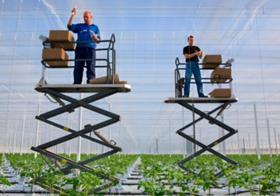
Thanet Earth, the UK’s largest greenhouse complex, is nearing first phase completion with more than half a million tomato and pepper plants now planted in its greenhouses.
On the eve of this milestone, a new independent report published by leading agricultural consultancy Bidwells Agribusiness has confirmed the very low carbon status of vegetables grown at the site, based on the industry standard for carbon emissions assessment.
It is just over a year since work began to convert the 91ha former cauliflower farm situated near in eastern Kent. The site’s three greenhouses are now complete along with seven vast reservoirs, a power generation plant able to supply electricity to 50,000 homes and substantial support infrastructure including an on-site packing facility.
The project represents a UK industry first, formed through a joint venture between three highly skilled grower organisations (Rainbow Growers, Kaaij Redstar and A&A Growers) and Fresca Group Ltd, the UK’s largest privately-owned fresh produce company.
As Thanet Earth Marketing Ltd – the joint venture company between Fresca and the growers – the business is expected eventually add an additional 15 per cent to British salad vegetable production, all of which will be sold locally in Kent and in supermarkets and independent stores across the country.
'Together they have conceived and realised a highly efficient growing model with exceptional environmental credentials,' said a spokesperson for the project.
The key findings of the Bidwells Agribusiness sustainability study were as follows:
– Peppers and cucumbers grown at Thanet Earth have very low carbon emissions, with a lower carbon footprint than those currently grown by all other alternative sources.
– Tomatoes grown without lights at Thanet Earth are more carbon efficient than the Mediterranean sources studied.
– Tomatoes grown at Thanet Earth with lights have a similar carbon footprint to UK-grown tomatoes grown without lights or combined heat and power (CHP).
– The use of CHP actually contributes a negative carbon emission towards the total measured Thanet Earth carbon footprint. The power is produced more efficiently than most other forms of UK power generation because it utilises both the heat and electricity produced by the fuel.
As Thanet Earth nears the completion of its first phase, planting of two if its three greenhouses has now been finalised. The first is owned by Dutch growers' cooperative Rainbow Growers for peppers and the second owned by Kaaij Redstar for tomatoes. Harvesting is scheduled to begin in early March of this year.
The third greenhouse, owned by A&A Growers, will be planted with cucumbers at the end of January, but with a much shorter lead time to production. Picking will start at the same time as the other crops.
'The eight-week-old, 30cm high plants, raised exclusively for the project, arrived just before the Christmas holidays and were individually transplanted into the new greenhouses,' explained the spokesperson. 'It took the first two grower companies and their dedicated teams of horticulturalists just four days to complete the planting covering a massive 18ha, equivalent to 25 football pitches.'
According to the project's leaders, all three greenhouses use the latest design and technical innovations to grow the crops. The tomato glasshouse, the largest in the UK at almost 10ha, will produce eight varieties of speciality vine tomatoes, all year round.
The pepper glasshouse, meanwhile, at just under nine hectares, will provide a full range of coloured sweet peppers for nine months of the year.
The greenhouses are heated using CHP. Put simply, each greenhouse has gas-powered engines which generate large amounts of electricity. The greenhouses themselves require very little operational power so almost all electricity is exported through a newly created link to the National Grid.
By-products of the power generation process (heat and carbon dioxide) are taken into the greenhouses to support the natural growing process of the plants. Where lights are used in winter tomato production, the power is also generated on site.
'With the UK effectively having a finite power requirement, Thanet Earth electricity will replace less efficient and more polluting forms of generation and therefore contribute to a reduction in the UK’s carbon footprint,' added the spokesperson.
The greenhouses are the largest single-structure growing sites in the UK. The on-site packhouse will pack all produce grown at Thanet Earth, with the crops marketed to the retailers via Thanet Earth Marketing Ltd, also based on-site.
The process from picking to shelf has apparently been designed to take advantage of all the latest available technologies and engineering in the industry to minimise manual handling on the route to the customer.



